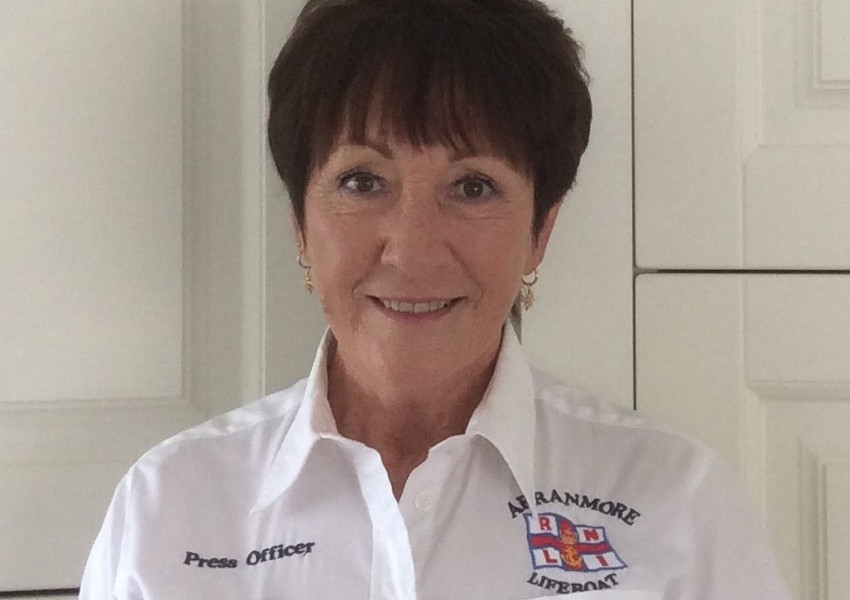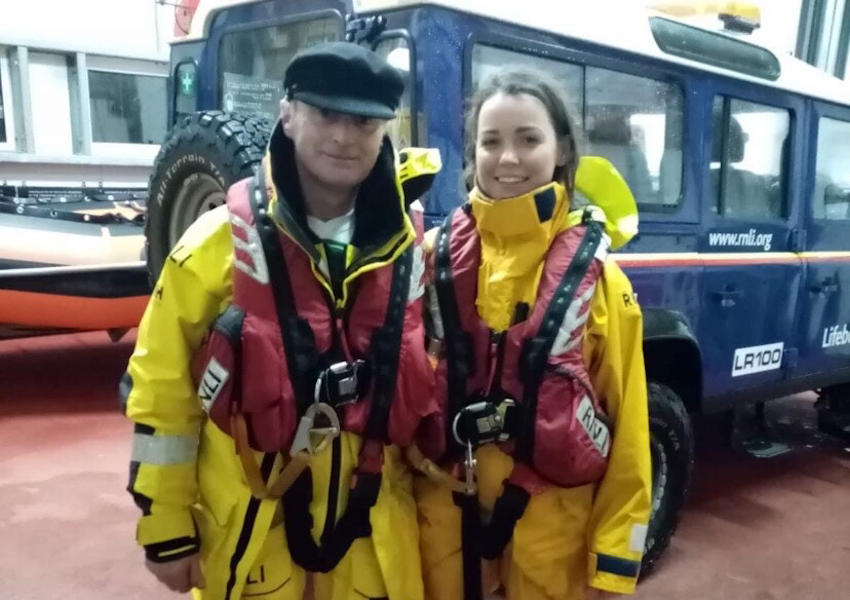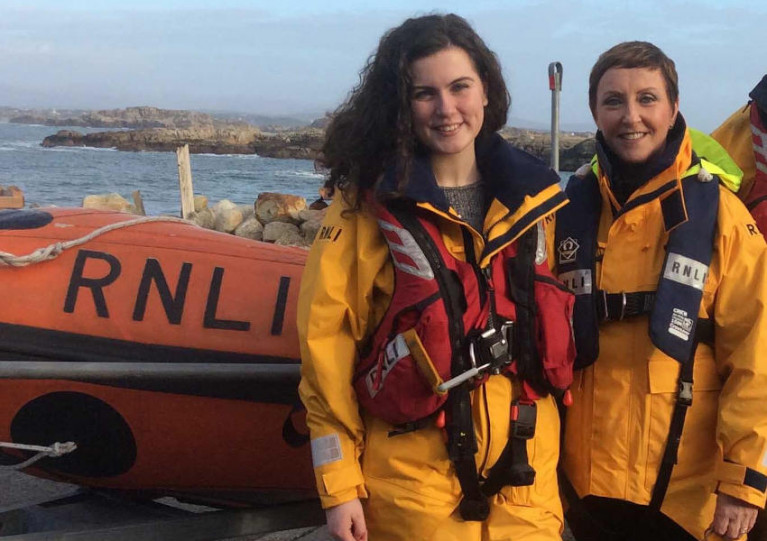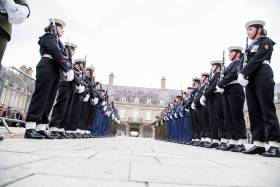Displaying items by tag: International Women's Day
A Sligo Bay RNLI helm has been celebrated as a finalist for the inaugural Captain Dara Fitzpatrick Award, hosted by the Irish Paramedicine Education and Research Network (IPERN).
Eithne Davis was nominated for the award by her lifeboat station team and, having been selected as a finalist, she attended a special ceremony at the University of Limerick on Wednesday (8 March) to mark International Women’s Day.
Five finalists were shortlisted by the IPERN Equality, Diversity and Inclusion Special Interest Group to award and recognise an inspirational female colleague working in the Irish pre-hospital community.
Frances Griffin of the National Ambulance Service picked up the award, which pays tribute to Captain Dara Fitzpatrick’s powerful legacy. Eithne was among the five finalists selected for embodying Dara’s values of compassion and kindness, strength and bravery, leadership and teamwork, and professionalism.
In submitting Eithne’s nomination, Sligo Bay RNLI said the station had a proud history of a strong representation of female crew.
“Eithne joined Sligo Bay RNLI at its inception in April 1998 and has been a steadfast member of the team since,” it said. “Her volunteering role with the RNLI spanned her life stages of rearing a young family, through various jobs and roles, to this year completing her doctorate in environmental studies. Over the past 25 years in all circumstances, she has carried her RNLI pager and been on call ready to launch to those in need of help at sea.
“She has been an outstanding member of the crew, was appointed our first female Helm in 1999, is a seagoing casualty carer and most recently was appointed as the station’s first local trainer and assessor. Of significance also is the fact that she was the first ever RNLI-retained inshore lifeboat mechanic in the fleet.
“In her 25 years, she has launched on service 164 times, involving 169 hours at sea, trained at sea for over 396 hours, and has been directly involved in the saving of nine lives, not to mention the other 131 people she has assisted, many requiring casualty care.
“Launching in an open lifeboat always requires bravery, but Eithne would not consider herself as anyone special. In one incident in very rough weather, when responding to a surfer in difficulty, the lifeboat slammed hard off a large wave and Eithne was injured.
“She pressed on with the callout towards the casualty only to stand down on notification that the person had gotten ashore safely. Eithne took a couple of weeks off to recover and then was back on the lifeboat as eager as always. If queried, her self-effacing attitude would likely be, ‘Sure it’s what we do, isn’t it?’”
International Women’s Day: Interview with Ardmore Shipping Bursary Cadet, Anwesha Das
On International Women’s Day (8 March) Ardmore Shipping which has chemical/product tankers trading globally and a principle operating office in Cork, highlights the maritime industry historically has lacked gender diversity, however this is changing as more women pursue careers in the field.
In recent years Ardmore have been improving diversity in shipping which has been a core priority for them and resulting in their participation in a variety of initiatives. This includes the Diversity Study Group (DSG) – the first organisation dedicated to diversity, equity, and inclusion (DEI) in the workplace across the global shipping and maritime sectors.
After joining the DSG, Ardmore played a leading part in the initiation of a charter that would allow signatories to make a public commitment to DEI across the industry. With the subsequent involvement and support of the Global Maritime Forum, this idea was realised through the recently-launched All Aboard Alliance.
Ardmore believes that nurturing and supporting talent is crucial to its success as a company, and DEI is an essential part of this. Together with our partners, we are working to attract women into the seafaring community, while addressing other core aspects of diversity.
On International Women’s Day, Ardmore taken the opportunity to highlight the invaluable role women contribute in their team of dedicated sea staff. Among them is Anwesha Das, an Ardmore Bursary Cadet who joined her first vessel in June 2022 after completing pre-sea training at the Anglo Eastern training academy in Karjat, India.
She shares her experience as a woman in maritime and highlights the increasingly gender-equal space the industry is becoming as various challenges are addressed.
Click HERE to read the interview in full.
RNLI Crews in Clogherhead and Dunmore East Celebrate Lifesaving Role of Women Volunteers
For generations, women have saved lives, launched lifeboats and raised millions for the RNLI. At Clogherhead and Dunmore East RNLI, among many others, women are continuing this lifesaving legacy.
In Clogherhead, Co Louth, as far back as March 1904 — because of circumstances at the time — it is reported that local women launched the lifeboat. The usual land crew were not available because of an incident at sea involving local fishermen who would usually have carried out the launch.
Fifty-four years since the first woman qualified as an RNLI crew member, women make up around 12.3% of the RNLI’s volunteer lifeboat crew, a figure which is steadily growing.
Clogherhead RNLI volunteer Lisa Levins said: “International Women’s Day is all about girl power, but we are one crew and everyone is equal regardless of what role they do for the wider Clogherhead RNLI team. It doesn’t matter if you are female or male, we are all working together to save lives and keep people safe.’
Volunteer Barbara Kirk said: “If we can inspire other women and girls to think that this is something they can do too, then that is a bonus.
“To anyone thinking about joining the RNLI, just give it a go. Even if you haven’t got any background on the water or don’t know your way around a boat, there are roles for everyone and the training and support is comprehensive.”
 Raina Freiberg is a volunteer crew members on Dunmore East RNLI’s all-weather lifeboat | Credit: RNLI/Nigel Millard
Raina Freiberg is a volunteer crew members on Dunmore East RNLI’s all-weather lifeboat | Credit: RNLI/Nigel Millard
Elsewhere, Raina Freiberg joined the RNLI in Tramore in 2005 at the age of 18, eager to make a difference in her community.
Now part of the Dunmore East RNLI lifeboat crew in Co Waterford, she is proud to have served on four lifeboats and three different lifeboat classes, gaining valuable experience and skills over the course of nearly 20 years service with the charity.
“As a woman in the RNLI, I feel privileged to be part of the station where Frances Glody paved the way in RNLI history,” Raina said.
In 1981, Dunmore East’s Frances Glody became the first female RNLI all-weather lifeboat crew member in Ireland. Today, women make up around 12.3% of the RNLI’s volunteer lifeboat crew, a figure which is steadily growing.
Raina is pleased to see the changes over the years, such as the new crew kit designed specifically for women. She says it's the little things that make big differences: “I’m thrilled to see all-female crews saving lives at sea and I believe that there is an opportunity for women to fulfil any role they desire in the RNLI. We are all working together to save lives and keep people safe.”
 Frances Glody was Ireland’s first female RNLI all-weather lifeboat crew member when she joined the Dunmore East unit in 1981 | Credit: RNLI Archive
Frances Glody was Ireland’s first female RNLI all-weather lifeboat crew member when she joined the Dunmore East unit in 1981 | Credit: RNLI Archive
Sue Kingswood, RNLI inclusion and diversity manager added: “Creating an inclusive culture which supports diversity is key to our long-term sustainability. So, we’re working hard to make sure that a wide range of people see the RNLI as a charity where they’re welcome as volunteers, supporters or staff.
“As we approach our 200th anniversary, women are now more evident in operational search and rescue roles throughout the RNLI than they have ever been before. They are also better represented across operational management and in SAR training roles, which is great to see.
“However, we still have a long way to go to achieve the representation we would like, not only where women are concerned, but across a much broader spectrum of diversity too.”
In recognition of International Women’s Day on 8 March, the Department of Transport is hosting a webinar to promote the benefits of gender balance, diversity and inclusion on its State Boards.
The department says it fully embraces the objectives identified in the Annex to the Code of Practice for the Governance of State Bodies 2016: Gender, Diversity and Inclusion, and aims to attain the Government’s target of 40% gender balance on State Boards.
However, achieving this gender balance and diversity at board level remains challenging, it adds.
This event — hosted by Ken Spratt, Secretary General of the department — will focus on practical steps, demystify the process of applying for a State Board position and will provide valuable insights into the challenges and opportunities provided by board positions.
“Our aim is to attract a more gender balanced and diverse range of candidates for State Boards under the aegis of the Department of Transport, to equip those boards to deliver on their remit and enjoy the benefits that such diversity can bring,” it says.
Both Minister for Transport Eamonn Ryan and Minister of State Hildegarde Naughton will contribute to the webinar “as they are both committed to continuously seeking out opportunities to drive further positive change,” the department adds.
“They recognise there is a significant pool of qualified and experienced female talent as well as candidates from other sectors of society, which would greatly enhance the culture and experience across our Transport Boards.”
This event is aimed at anyone who feels they could actively contribute to boards in the public transport, maritime, aviation and road safety arenas.
The webinar will take place from 10.45am to noon on Thursday 3 March. Also speaking will be Fiona Ross, chair of CIÉ, and Michelle Noone, head of senior and executive recruitment with the Public Appointments Service.
To attend the webinar, register via Zoom. After registering, you will receive a confirmation email containing information about joining the webinar.
For more information on how to apply for State Board appointments, vsit www.stateboards.ie.
Since Sir William Hillary founded the RNLI in 1824, women have had a role in the service — initially working in the background by helping to launch and recover the lifeboats, fundraising for the voluntary service and supporting their husbands and sons when the lifeboat went to the rescue.
Today, women are taking their place at the forefront of the RNLI, serving as crew members, leading fundraising campaigns and of course still supporting their family who crew the lifeboats.
Arranmore RNLI off mainland Donegal was founded in 1883 and although it was only men with a knowledge of the sea who crewed the lifeboats, without the support of their female family members they would have had difficultly manning the vessels while looking after young families.
The women of Arranmore were always very resilient, from dealing with the hardships and tragedies of island living in their every day lives, to playing a vital role in supporting the lifeboat families when the crew were responding to a difficult rescue in horrendous weather conditions.
An example of the type of rescues the Arranmore RNLI were involved in was in December 1940, when they rescued 16 crew members of The Stolwyjk in the most challenging weather conditions. The crew were awarded gold, silver and bronze medals for the very memorable rescue.
Today, as in every lifeboat station throughout Ireland and the UK, Arranmore RNLI is proud to have women crew members. Lifeboat press officer Nora Flanagan was the first woman to join the Arranmore RNLI crew, and four more women have since joined the crew in this vital lifesaving service.
 Nora Flanagan was the first woman to join Arranmore RNLI’s crew | Photo: RNLI/Arranmore
Nora Flanagan was the first woman to join Arranmore RNLI’s crew | Photo: RNLI/Arranmore
These women are Karen McGowan, a registered advanced nurse practitioner in Beaumont Hospital and president of the Irish Nurses and Midwives Organisation (INMO); round-the-world sailor Sharon O’Donnell; Erin McCafferty, a student at NUI Galway; and primary school teacher Aisling Cox.
Karen McGowan joined the Arranmore RNLI crew at age 17 and continued to serve throughout her nursing training. Speaking to Karen about why she joined the RNLI, she said: “I enjoyed the adrenaline rush and I knew I wanted to train as a nurse; as a crew member on the lifeboat I gained a huge amount of experience with the excellent training the RNLI provides. Dealing with medical emergencies on a callout served me well in my student nurse training.
“I had quite a few memorable rescues during my time as a crew member but the most poignant was rescuing the crew of a sinking trawler. As soon as the crew were brought on board the Lifeboat the trawler sank very quickly. It was very hard to watch somebody’s livelihood sink beneath the waves and witness the raw emotion on the faces of both the lifeboat and the trawler crews.
“I would encourage anybody to join their local RNLI, it really helps you think outside the box and the crews are very supportive and helpful to new recruits”.
All crew members are required to serve a probationary period where they learn all the skills involved in saving lives. Learning is competence-based and crew members must prove their competency in one skill before taking on another. This training enables all volunteers, many of whom have little or no knowledge of boats or the sea, to become first-class lifesavers.
The first RNLI women’s award was to honour Grace Darling, a lighthouse-keeper’s daughter who helped rescue nine people in 1838.
 Aisling Cox with her dad and fellow crew member Kieran | Photo: RNLI/Arranmore
Aisling Cox with her dad and fellow crew member Kieran | Photo: RNLI/Arranmore
Voluntary fundraising committees are an essential part of the RNLI and women are very much to the fore in raising funds to keep the lifeboats afloat.
As the charity celebrates International Women’s Day, it salutes the selflessness and dedication of the many women of the RNLI involved in saving lives at sea.
Grace Gallagher has been a member of the Arranmore fundraising committee for over 25 years. She has been honoured and recognised by the RNLI as the longest-serving member of the fundraising committee and has raised thousands of euro for the RNLI.
Grace said: “I can’t believe I’ve been fundraising for the RNLI for over 25 years. Living by the sea and with many of our families involved in the fishing industry, we rely on the lifeboat and the contribution of the public to continue with this essential voluntary service. It has been a pleasure to be part of it.”
Other remarkable women connected with Arranmore RNLI include Sadie Bonner, a former postal worker who started supporting the RNLI by collecting fundraising buckets from shops and selling badges, and who is now treasurer of the fundraising committee; and Arranmore RNLI station president Majella O’Donnell.
#1916women - Female sailors,soldiers, and airwomen of the Defence Forces took part in the International Women's Day event yesterday in Royal Hospital Kilmainham. The event included a 30 woman, tri-service Captain's Guard Of Honour led by Captain Danielle Murphy, to commemorate the role of women in the events of the 1916 Rising.
Lieutenant Colonel Mary Carroll, Officer Commanding An Chéad Cathlán Choisithe (1st Infantry Battalion) and a member of the Ireland 2016 'Women's Workshop' said; 'Today we are honouring the role of women in 1916. Considering universal suffrage was not wide place at the time, they broke the mould for women with their bravery. Margaret Skinnider, who lead men in combat during the Rising said "they were fighting for the same right to risk their lives as the men." When I first started in the military in 1982 there was so few of us. Aside from the Medical Corps, the first female Cadets and Recruits started in 1980. While other militaries do not permit women in front line roles, the Irish Defence Forces have had female bomb disposal officers, snipers, pilots, APC Commanders. Women have held appointments as Ship's Captains and Infantry Units overseas. We are moving forward positively.'
Chief of Staff of the Defence Forces Vice Admiral Mark Mellett DSM, who also attended the event, said; ''This is a fantastic day for the women of Óglaigh na hÉireann. There are currently 557 women in the Army, Air Corps and Naval Service, representing 6.1% of our overall strength. Óglaigh na hÉireann are committed, openly and unambiguously to increasing the number of women in our organisation.
Further female participation and increased diversity in any organisation, including the military, improves operational reach as well as providing a counter weight against the increasing complexity we face."
It is expected that the Defence Forces will be accepting applications for Cadets and General Service Recruitment in the coming year , supported by a social media campaign aimed at encouraging young women to join the Defence Forces.































































